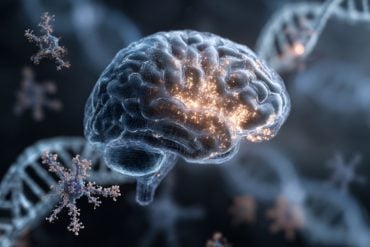Summary: Researchers found significant links between a pregnant woman’s gut microbiota and changes in her immune system. By analyzing the gut microbiota, metabolite profiles, and cytokine levels of pregnant and non-pregnant women, researchers found distinct differences indicating that specific microbes and metabolites influence the immune response during pregnancy.
The study highlights how variations in the gut microbiome can affect maternal immunity by altering levels of inflammatory and anti-inflammatory cytokines, with potential implications for understanding complications like preeclampsia. However, the study’s authors call for further research to clarify these findings due to its small sample size and the observational nature of the study.
Key Facts:
- Pregnant women exhibited a unique gut microbiota composition and cytokine profile compared to non-pregnant women, suggesting the microbiota’s role in modulating immune responses during pregnancy.
- The study identified 46 connections among microbes, metabolites, and cytokines, with certain microbes potentially inhibiting pro-inflammatory responses, highlighting a complex interaction affecting maternal immunity.
- Despite its insights, the study acknowledges limitations such as its small sample size and lack of causation, underscoring the need for more extensive clinical trials to explore these associations further.
Source: American Society for Microbiology
During pregnancy, a woman’s immune system changes dramatically but researchers don’t yet understand all the underlying mechanisms. A new study shows how the gut microbiota may play a role.
In a paper published this week in mSystems, researchers in China report that during pregnancy, changes in levels of cytokines—immune system proteins important in inflammation—may be linked to specific alterations in the mother’s gut microbiome and in plasma and fecal metabolites.
“To the best of our knowledge, these associations were first explored in our study,” said first author Ting Huang, M.D., from the First Affiliated Hospital of Jinan University in Guangzhou, China.
Pregnancy brings a raft of changes, including fluctuations in hormones, changes to a woman’s body structure, and variations in the immune system. Previous studies have identified changes to the gut microbiome that can occur during pregnancy; they have also suggested that those changes may influence physiological processes in the mother through metabolites.
Disturbances in the microbiota, for example, have been connected to the promotion of preeclampsia, a dangerous pregnancy complication characterized by high blood pressure. However, it remains unclear how alterations in the gut microbiota during pregnancy affect maternal immunity.
To investigate these connections, the researchers at the First Affiliated Hospital of Jinan University compared the gut microbiota, metabolite profiles and immune system status of 30 healthy pregnant women to 15 healthy women who weren’t pregnant. All the women in the study were between 18 and 34 years old.
Fecal and blood samples were collected from the pregnant women during or after the 37th week of pregnancy, and samples from non-pregnant women were collected on the 14th day of the menstrual cycle.
Analyses of the fecal samples showed that Firmicutes was the most dominant phylum of bacteria in both groups of women. However, Bacteroidota bacteria accounted for a smaller relative share of the microbial population in pregnant women than in non-pregnant women.
Pregnant women also showed a higher relative abundance of both Actinobacteriota and Proteobacteria, compared to non-pregnant women.
The researchers similarly found a distinct difference in the cytokine levels in the 2 groups. Pregnant women had lower levels of cytokines that promote inflammation, and they showed higher levels of cytokines that act against inflammation. These results suggest that the immune system may be suppressed during pregnancy, the authors noted.
The researchers then identified hundreds of metabolites found in the plasma and fecal samples. They found that each group—pregnant and non-pregnant women—had its own distinct collection of metabolites, or metabolome.
Notably, many of those metabolites were connected to bile acid secretion and metabolism, and bile acids have previously been tied to inflammation. In further analyses, they found that some enriched metabolites in pregnant women were associated with lower levels of pro-inflammatory cytokines.
Similarly, some of the depleted metabolites are associated with increases in pro-inflammatory cytokines.
Finally, the group identified a total of 46 connections among microbes, metabolites and cytokines. They found that some microbes enriched in pregnant women, for example, may inhibit an immune response by inhibiting pro-inflammatory metabolites. Overall, Huang said, the results support the idea that gut microbes interact with host metabolites to change cytokine levels in the blood.
However, Huang cautioned that the study doesn’t establish causation. In addition, the small sample size may amplify errors arising from individual differences, and the design of the study doesn’t account for cofounding factors, like diet. More clinical trials are needed, the researchers said, to confirm and better elucidate the connections.
About this microbiome, immunity, and pregnancy research news
Author: Joanna Urban
Source: American Society for Microbiology
Contact: Joanna Urban – American Society for Microbiology
Image: The image is credited to Neuroscience News
Original Research: The findings will appear in mSystems







